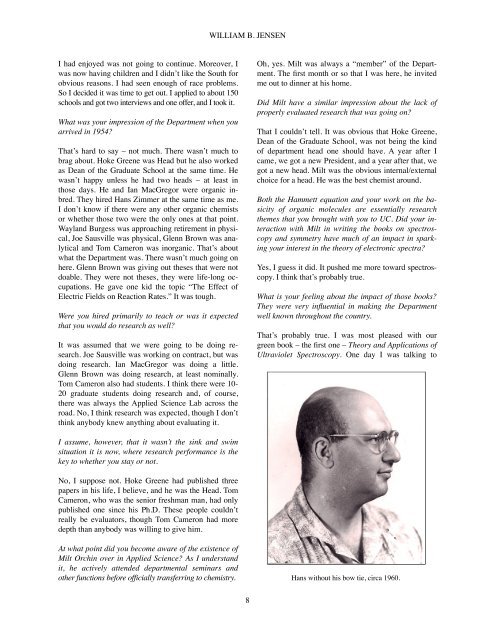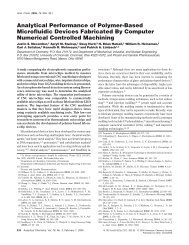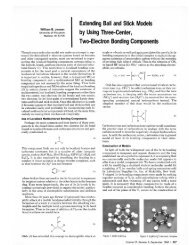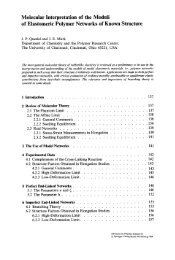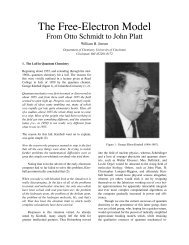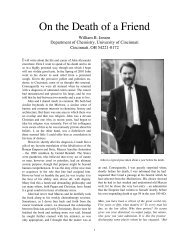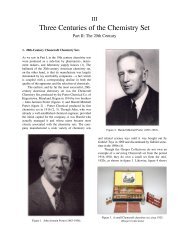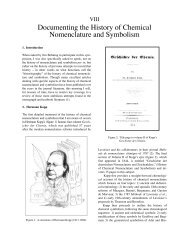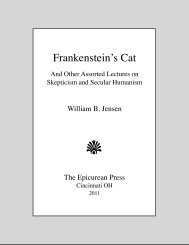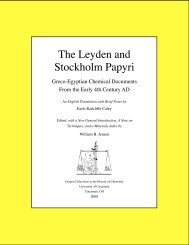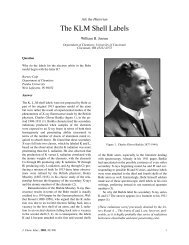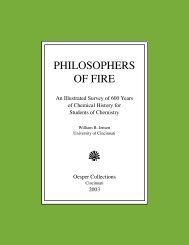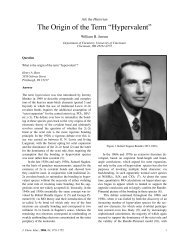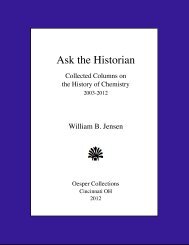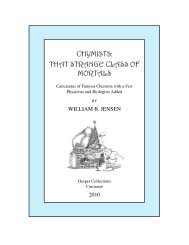043. Hans Jaffe.pdf - University of Cincinnati
043. Hans Jaffe.pdf - University of Cincinnati
043. Hans Jaffe.pdf - University of Cincinnati
You also want an ePaper? Increase the reach of your titles
YUMPU automatically turns print PDFs into web optimized ePapers that Google loves.
I had enjoyed was not going to continue. Moreover, I<br />
was now having children and I didn’t like the South for<br />
obvious reasons. I had seen enough <strong>of</strong> race problems.<br />
So I decided it was time to get out. I applied to about 150<br />
schools and got two interviews and one <strong>of</strong>fer, and I took it.<br />
What was your impression <strong>of</strong> the Department when you<br />
arrived in 1954?<br />
That’s hard to say – not much. There wasn’t much to<br />
brag about. Hoke Greene was Head but he also worked<br />
as Dean <strong>of</strong> the Graduate School at the same time. He<br />
wasn’t happy unless he had two heads – at least in<br />
those days. He and Ian MacGregor were organic inbred.<br />
They hired <strong>Hans</strong> Zimmer at the same time as me.<br />
I don’t know if there were any other organic chemists<br />
or whether those two were the only ones at that point.<br />
Wayland Burgess was approaching retirement in physical,<br />
Joe Sausville was physical, Glenn Brown was analytical<br />
and Tom Cameron was inorganic. That’s about<br />
what the Department was. There wasn’t much going on<br />
here. Glenn Brown was giving out theses that were not<br />
doable. They were not theses, they were life-long occupations.<br />
He gave one kid the topic “The Effect <strong>of</strong><br />
Electric Fields on Reaction Rates.” It was tough.<br />
Were you hired primarily to teach or was it expected<br />
that you would do research as well?<br />
It was assumed that we were going to be doing research.<br />
Joe Sausville was working on contract, but was<br />
doing research. Ian MacGregor was doing a little.<br />
Glenn Brown was doing research, at least nominally.<br />
Tom Cameron also had students. I think there were 10-<br />
20 graduate students doing research and, <strong>of</strong> course,<br />
there was always the Applied Science Lab across the<br />
road. No, I think research was expected, though I don’t<br />
think anybody knew anything about evaluating it.<br />
I assume, however, that it wasn’t the sink and swim<br />
situation it is now, where research performance is the<br />
key to whether you stay or not.<br />
No, I suppose not. Hoke Greene had published three<br />
papers in his life, I believe, and he was the Head. Tom<br />
Cameron, who was the senior freshman man, had only<br />
published one since his Ph.D. These people couldn’t<br />
really be evaluators, though Tom Cameron had more<br />
depth than anybody was willing to give him.<br />
At what point did you become aware <strong>of</strong> the existence <strong>of</strong><br />
Milt Orchin over in Applied Science? As I understand<br />
it, he actively attended departmental seminars and<br />
other functions before <strong>of</strong>ficially transferring to chemistry.<br />
WILLIAM B. JENSEN<br />
8<br />
Oh, yes. Milt was always a “member” <strong>of</strong> the Department.<br />
The first month or so that I was here, he invited<br />
me out to dinner at his home.<br />
Did Milt have a similar impression about the lack <strong>of</strong><br />
properly evaluated research that was going on?<br />
That I couldn’t tell. It was obvious that Hoke Greene,<br />
Dean <strong>of</strong> the Graduate School, was not being the kind<br />
<strong>of</strong> department head one should have. A year after I<br />
came, we got a new President, and a year after that, we<br />
got a new head. Milt was the obvious internal/external<br />
choice for a head. He was the best chemist around.<br />
Both the Hammett equation and your work on the basicity<br />
<strong>of</strong> organic molecules are essentially research<br />
themes that you brought with you to UC. Did your interaction<br />
with Milt in writing the books on spectroscopy<br />
and symmetry have much <strong>of</strong> an impact in sparking<br />
your interest in the theory <strong>of</strong> electronic spectra?<br />
Yes, I guess it did. It pushed me more toward spectroscopy.<br />
I think that’s probably true.<br />
What is your feeling about the impact <strong>of</strong> those books?<br />
They were very influential in making the Department<br />
well known throughout the country.<br />
That’s probably true. I was most pleased with our<br />
green book – the first one – Theory and Applications <strong>of</strong><br />
Ultraviolet Spectroscopy. One day I was talking to<br />
<strong>Hans</strong> without his bow tie, circa 1960.


